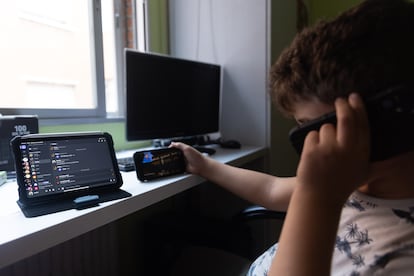Excessive use of screens leads children to need them even more


Knowing exactly what problems screens cause in children and adolescents is one of the biggest questions in science today. There is data on emotional problems in young people, and it's clear that one of the biggest innovations of the last decade has been mobile phones. But scientists disagree on whether screens are the cause of these emotional problems . A new scientific article analyzing nearly 300,000 children in 117 studies believes it has found a more solid answer: "What gives us more confidence is that we analyzed studies that followed the same children over time, not just at specific moments," says Roberta Pires Vasconcellos, a researcher at the University of New South Wales (Sydney, Australia) and co-author of the study, published in the journal American Psychological Association.
The study has confirmed that those who use more screens at age 5 have more problems at age 7. “It's stronger evidence than just noting that those who use more screens now have problems; there's a wealth of data that points in the same direction,” explains Pires Vasconcellos.
The research focuses only on children under 10 years old because similar studies have already been conducted on adolescents. "It's at this stage that the foundations of emotional health are built. It's like learning to read: if you struggle at first, it affects everything else," says Pires Vasconcellos, who also confirms that these problems continue to increase with age, and the results show that the effects become stronger over time.
One of the study's most striking findings is that increased screen use among children leads those young people to need them even more. A vicious cycle emerges: "Children with problems may be more likely to use screens (to meet unmet emotional needs)," the authors write in the study. "And children who use screens excessively may be more likely to have those needs unmet (for example, because they are less engaged in school, with family, or with their friends)."
Anxiety, sadness, low self-esteemThe goal of the study is to detect what they call "socio-emotional problems," which are difficulties children have managing their emotions and behavior, such as anxiety, feeling sad, or having low self-esteem. Behaviorally, these problems can include being aggressive, having trouble concentrating, or constantly breaking rules.
This type of behavior occurs when children struggle to manage their feelings or get along with others. The authors believe that excessive screen use is often a "symptom" of these problems, not their cause: "If your child is glued to the tablet, they may be trying to manage anxiety or feeling lonely," says Pires Vasconcellos. "Taking away the iPad isn't going to solve it; you have to ask yourself why they're so hooked on the screen and help them find better ways to cope with what they're feeling. It's like treating a fever without asking what infection is causing it. Setting a timer isn't enough," she adds.
By analyzing children under 10 years old, the study doesn't specifically address two of the main alleged culprits of adolescent problems: social media and mobile phones. The typical age for legal social media use is 13, and mobile phones are usually available from 12 onwards. Although many families exceed these limits, it's difficult to find widespread use in children under 10. "Our data suggests that mobile phones worsen the situation because the effects were stronger in studies from 2012 to 2020, just when they began to be widely used. And since the pandemic, we see that many children with emotional problems are turning to screens even more. But the truth is that we find similar problems and patterns with all devices: TV, computer, tablet," says the scientist.
Video games, guiltyBefore the age of 10, according to the study, the problem is more video games than social media: “What's important isn't so much what screen they use, but what they do when they're in front of it. Gaming was clearly what caught our attention the most. Kids who play video games are much more likely to develop emotional problems. We couldn't study social media in depth because, in theory, they're for ages 13 and up, although we know that many more kids use them secretly,” says the researcher.
This dominance of video games over social media at that age partly causes a gender imbalance. “It’s complex,” says Pires Vasconcellos. “In general, girls who use screens a lot showed slightly more emotional problems than boys. But when we look at older children, between 8 and 10 years old, boys seem more vulnerable, especially with video games. Boys at that age who already have emotional problems tend to take refuge in screens, and that ends up making things worse,” she adds.
EL PAÍS




